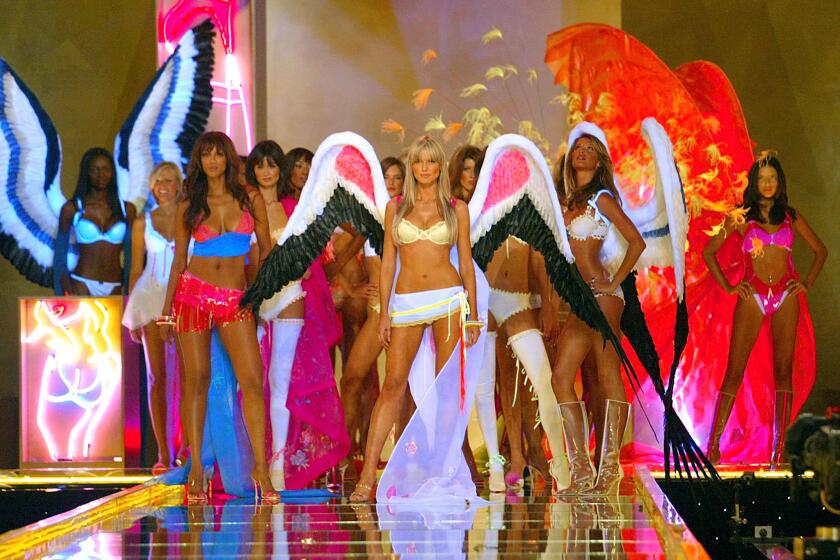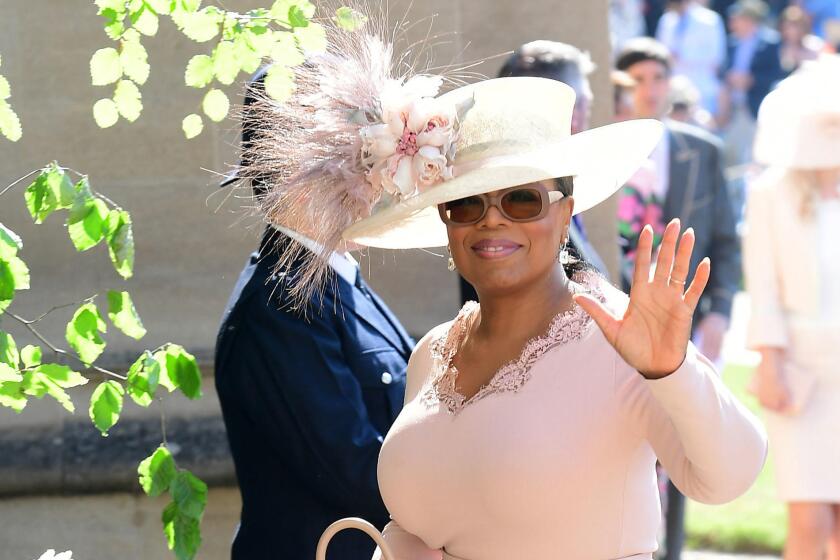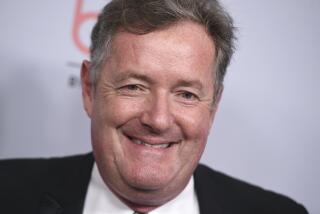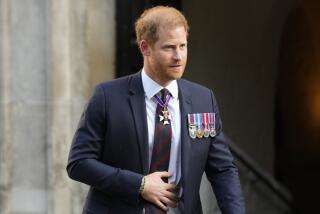‘A prosecutor’s dream’: Inside the bombshell interview that brought down Prince Andrew
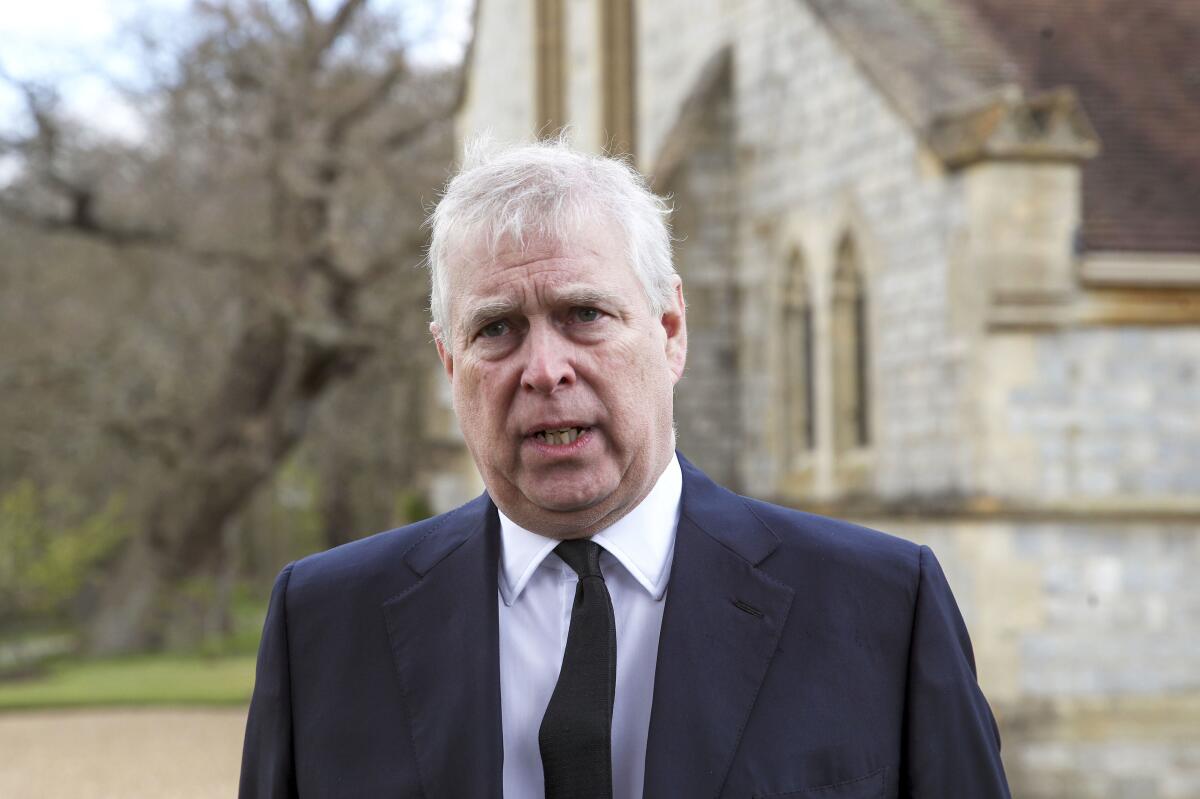
- Share via
LONDON — Around a table with three BBC journalists in Buckingham Palace, Queen Elizabeth’s second son was deciding whether to do a TV interview that would change his life.
Three months earlier, in August 2019, the billionaire sex offender Jeffrey Epstein had been found dead in his New York prison cell while awaiting trial on sex-trafficking charges. For nearly a decade, Prince Andrew had been dogged by questions about their 20-year friendship — and now was facing allegations of his own. Virginia Roberts, now Giuffre, alleged that Epstein had forced her to have sex with Andrew when she was 17, something the Duke of York has always denied.
At the palace, Sam McAlister — “booker extraordinaire” on the BBC’s flagship current affairs show, “Newsnight,” who had been in discussions for a year with a publicist working for Andrew’s initiative to support entrepreneurs and his private secretary — took her gamble.
Referring to his extravagant travel at taxpayers’ expense and his playboy image, she told him bluntly: “Sir, I have lived in this country for over 40 years and, until now, I only knew two things about you. It’s that you’re known as ‘Air Miles Andy’ and ‘Randy Andy.’ And I can absolutely tell you that the latter really doesn’t help you in your current predicament.”
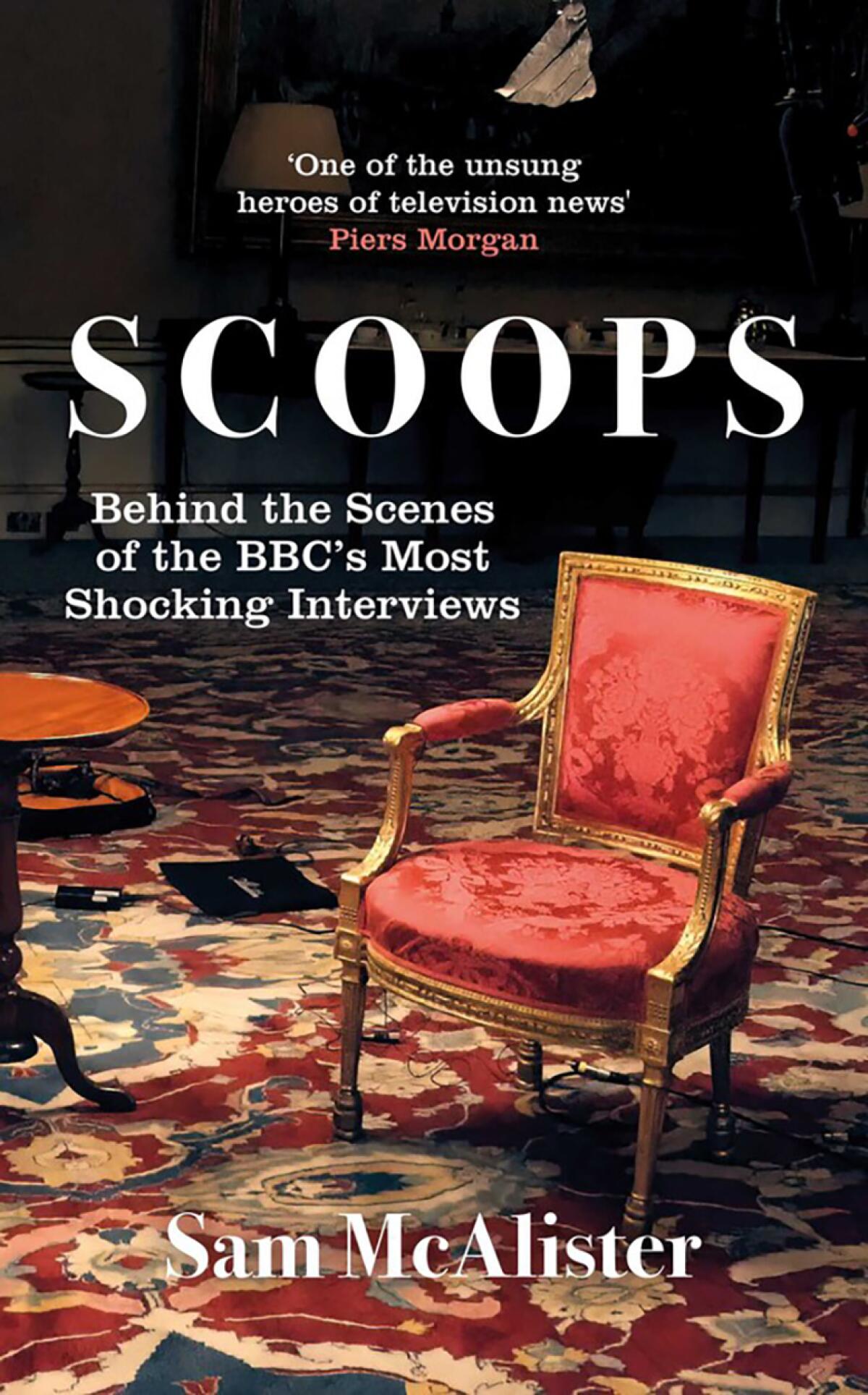
Everyone in the room held their breath; that is not how Britons speak to royalty. “Then, suddenly, he laughs,” recalls McAlister in a central London restaurant. “There was no way that he could misunderstand that he was dealing with someone who could speak truth to power and who wasn’t messing him about.”
Three days later, after mentioning in front of McAlister that he would consult “Mum,” Andrew did the interview. It would be described as “a plane crashing into an oil tanker, causing a tsunami, triggering a nuclear explosion.” So damning were his answers that just four days after broadcast came the announcement he would be suspending his public duties. The 50-minute encounter had brought down a prince.
In her new book, “Scoops: Behind the Scenes of the BBC’s Most Shocking Interviews” (Oneworld Publications, Sept. 13), McAlister reveals the tense discussions that secured her exclusive. Despite a perceived coziness between the national broadcaster and the monarchy, to her knowledge, her program had never spoken to a royal. When first offered access in 2018 — to do what she calls a “puff piece” on his charity work — she turned it down, telling his PR people firmly: No preconditions, or no interview. As the Epstein questions grew louder, McAlister persevered.
The disgraced financier and his connection to CEO Leslie Wexner feature in Hulu’s ‘Angels and Demons,’ about the lingerie brand’s rise and fall.
“One of the reasons this interview happened is I didn’t have any connections in this world,” she says. “And, in the nicest way, I didn’t give a toot. I don’t think it’s helpful, frankly, to be deferential to institutions if you want to get the truth.”
She kept in mind the “sweet spots” that might motivate the prince to go ahead: a desire for vindication in time to celebrate his 60th birthday in style and to walk his daughter Beatrice down the aisle.
She also shared her view with him directly: His silence meant “the public was drawing conclusions on his guilt.” Finally, she told him, it was a “no-brainer” that any interview about sexual impropriety with women would have to be conducted by a woman. “And, lucky me, I had one of the best female presenters in the country” in the form of Emily Maitlis. (The program was also edited by a woman, Esme Wren.)
McAlister even ventured to make several jokes with her royal interlocutor, though she demurs on the details: “Probably the most banterous parts wouldn’t be right for me to reveal. But you heard some of the things that he was willing to say on camera, so you can probably imagine how frank some of those exchanges were.”
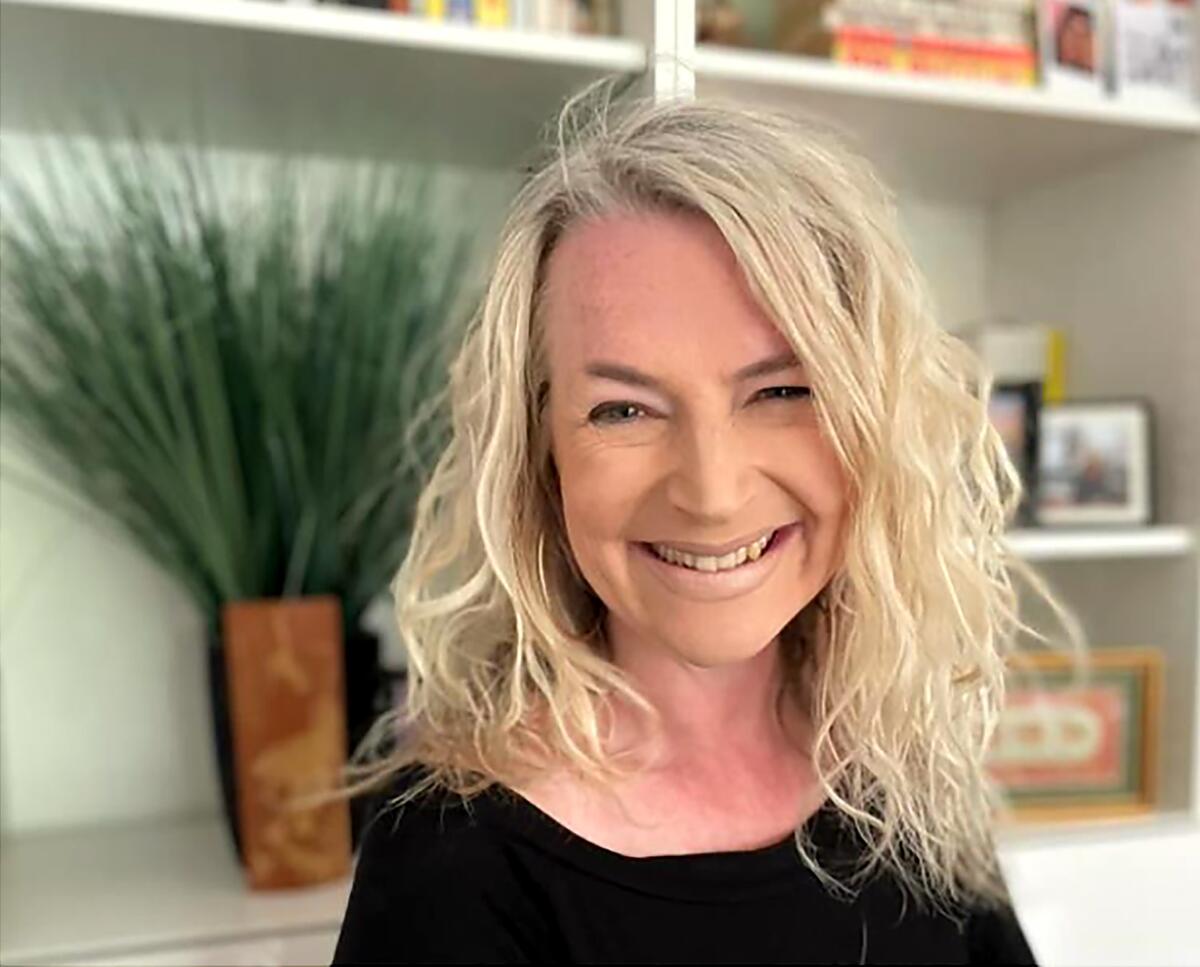
What he said on the record left audiences aghast and, says McAlister, “changed the lexicon of the country.” Andrew denied his accuser’s claim he was perspiring when they first met because he had “a peculiar medical condition, which is that I don’t sweat.” His alibi was a children’s birthday party at the chain restaurant Pizza Express in the provincial English town of Woking.
He said that after Epstein’s 2008 conviction, he had insisted on spending several days in the financier’s New York home to break off the friendship because his judgment “was probably colored by my tendency to be too honorable, but that’s just the way it is.” And his description of Epstein having “conducted himself in a manner unbecoming” managed to break even the quietly forensic demeanor of Maitlis. “Unbecoming?” she interjected, her face contorted in disbelief. “He was a sex offender.” All the while, the prince failed to express any concern for the victims and, asked if he regretted the whole Epstein friendship, replied: “No, still not.”
Yet none of those was the most jaw-dropping moment for McAlister. Rather, it was “a very excruciating answer, where he’s trying to say that he couldn’t have had sexual relations with Virginia Roberts because, as a man, sexual relations require ‘a positive act.’ He was obviously talking about the royal member. We don’t want to make light of what obviously was an extremely serious series of allegations against him and Epstein, but to be in Buckingham Palace listening to him talking about that was really quite unforgettable.”
It was all so arresting that the journalist spent much of the time staring at the ornately decorated ballroom carpet to conceal her eye rolling, while trying to inhibit her natural response to stress whereby, she writes, “My throat, charmingly, starts to make a kind of burpy noise.” She has a final giveaway: “I sweat — irony of ironies!”
The two-hour extravaganza on CBS demonstrated the power of broadcast TV -- and Oprah Winfrey.
As a former criminal defense barrister, McAlister knew full well the legal ramifications of Andrew’s answers, describing them as “a prosecutor’s dream.” She adds: “I was surprised that he gave those explanations, which if you were dealing with litigation would have been relatively easy to disprove if they were lies.”
Giuffre’s attorney later revealed she and her team had examined the interview for inconsistencies. “Frankly, it was very helpful for us,” she said.
The revelations may explain why Andrew was so keen to settle his U.S. civil sexual assault case with Giuffre in February this year, paying a reported $16 million to a woman he told Maitlis he had “no recollection of ever meeting.”
McAlister, who has since left the BBC after being denied a bonus, pay raise or promotion, has already struck a deal to turn her book about what she calls “our version of Frost/Nixon” into a feature film, while Maitlis is having her story adapted for a TV drama. The producer says she believes Britain has a “blind spot, journalistically” when it comes to holding the royal family accountable in the same way as others who spend public money. But she still thinks the U.S. could learn something about exacting interviews from across the pond — and cites the 2021 Oprah Winfrey exclusive with Meghan, Duchess of Sussex, and Prince Harry as an example.
“It was an incredibly interesting conversation that they had. But by no stretch of the imagination was that an accountability interview.
“I think that our tradition of rigorous conversations really does allow for accountability and that’s hugely important, particularly in this generation of fake news and diminution of trust in the media.
“As I’ve always said, if you can run a multimillion-dollar company and you can run a country, then 10 minutes with a presenter isn’t any problem, is it?” She checks herself. “Well, for some people it is, clearly.”
More to Read
The complete guide to home viewing
Get Screen Gab for everything about the TV shows and streaming movies everyone’s talking about.
You may occasionally receive promotional content from the Los Angeles Times.
